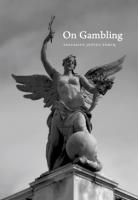
LYSA (2022) h/b 284pp €39 (ISBN 9789464447668)
‘LYSA publishes research monographs, edited volumes and critical editions (with or without facing translation), serving academics around the world by producing high-quality scholarly books in the Humanities in both print and electronic format. For now, LYSA’s focus is on early modern literature and intellectual history, with as main subject areas Neo-Latin studies, classical receptions and antiquarianism.’ I here declare an interest: my old colleague Professor Keith Sidwell is a member of the Editorial Board.
Pascasius’ de alea (1561)—its full title is Alea, sive de curanda ludendi in pecuniam cupiditate libri II—is the first of LYSA’s publications in the Neo-Latin subject area, under the general editorship of Dr Jeroen de Keyser (the second, which will also be reviewed on this site, is Henri Estienne’s [Stephanus] de libris). It contains Barton’s full introduction followed, Loeb-style, by the Latin text and facing-page translation of the whole work (including contemporary puffs for the book, dedication, Foreword and so on), plus a bibliography, Index locorum and Index nominum. I observe here that Vincent Obsopoeus’ de arte bibendi [1536], with a section warning against turning drinking into a gambling game [top tip: first get your opponent drunk], was published in a jovial translation, with facing-page Latin, by Princeton [2020], reviewed on this site (here). It suggests that LYSA has struck a potentially fruitful vein to quarry.
Pascasius, born about 1520 into a wealthy East Flanders family, studied abroad in Italy and came under the influence of Gerolamo Cardano, a professor of medicine who was himself a compulsive gambler. The uita of Pascasius says that he too became an aficionado; he may have picked it up from Cardano. Both of them in fact composed a treatise on the topic, Pascasius perhaps encouraged by his master. As Barton’s Introduction points out, games and leisure pastimes show a marked rise in popularity in the 16th and 17th centuries and, while often condemned as a waste of time in their own right, attracted even more obloquy when they became associated with gambling.
De alea originated from a lecture which Pascasius gave at the University of Bologna: he was persuaded to turn it into a book (1561). In plain but vigorous Latin, he combines argument, anecdotes, historical and literary exempla, frequent reference to classical medicine—Celsus and Galen are important influences—philosophy and Christian doctrine, and much local gossip and personal comment to make the case that gambling invites the same obsessive and compulsive behaviour as falling in love (a theme to which he returns at the end of his treatise). It is, in other words, a psychological disorder, a form of mental illness, with dreadful consequences (gamblers wager their wives! Ejaculate while gambling! And so on). As he puts it, ‘gambling is a serious long-term disease of the mind which, based as it is on the erroneous idea of future gain resulting from the mastery of chance, is driven by a desire to gamble as frantic as it is wild’.
This theme he expands at enormous, inventive and didactic length in book I, drawing on Aristotle to define the causes of the problem: the formal cause being optimism, the efficient cause being hot temperament (the influential ancient theory of the four ‘humours’), and the final cause a desire for an easy and comfortable life, all material needs being satisfied. One notable feature is that Pascasius prefaces his Foreword with a series of Problemata, that is, a sort of list of contents put in the form of questions, e.g. ‘why women are strongly attracted to gambling, when they are inclined rather to good management in almost all issues’—designed to serve the needs of medieval disputationes.
So how is one to cool the excesses of the gambler’s over-heated desires? The answer finally emerges in Book II: a mental disorder will be cured by mental activity, to calm and restrain the destructive impulses inside us which so inflame the body and urge men to take what is not theirs by gambling. Here Pascasius quotes Euripides: ‘reason overcomes everything’. It is therefore by the constant exercise of reason and the wisdom (especially Stoic wisdom) to which it leads that is the saving grace for the gambling sinner, combined with the determination to do the right thing whatever the temptations. Here Pascasius can be said to have anticipated aspects of cognitive therapy.
After a long paraphrase of Cicero’s de officiis 3.21-27 on the law of nature that no man must covet, let alone take, the property of others, Pascasius in conclusion offers, as Celsus also suggested, three useful sayings for repetition by the man struggling with temptation: from Aesop’s Fables, ‘In his desire for horns the camel lost his ears’; from St. Augustine, ‘He who loves danger deserves to die in danger’; and from Cicero, ‘Making money without harming anyone cannot be censured. But it would be better to give up one’s own life than to harm others for one’s own advantage, even if it were possible to hide this from the gods and men.’ He ends by returning to the parallel between gambling and love, and citing Aeneas who, ‘in spite of the great love that shakes his soul, carries out the orders of the gods’, and encourages gamblers to ‘keep this precept in mind and in front of their eyes: “Obey God” (Ἕπου Θεῷ)’.
Barton’s translation is clear, accurate and easy to read, and he has done a fine job of introducing Pascasius and editing his text. So too have the publishers: the book is a high quality production, a pleasure to handle and use, with footnotes at the bottom of each page (three cheers for that alone), including Pascasius’ own brief summaries of his argument at that point. At €39 it strikes this reviewer as very good value.
Peter Jones
